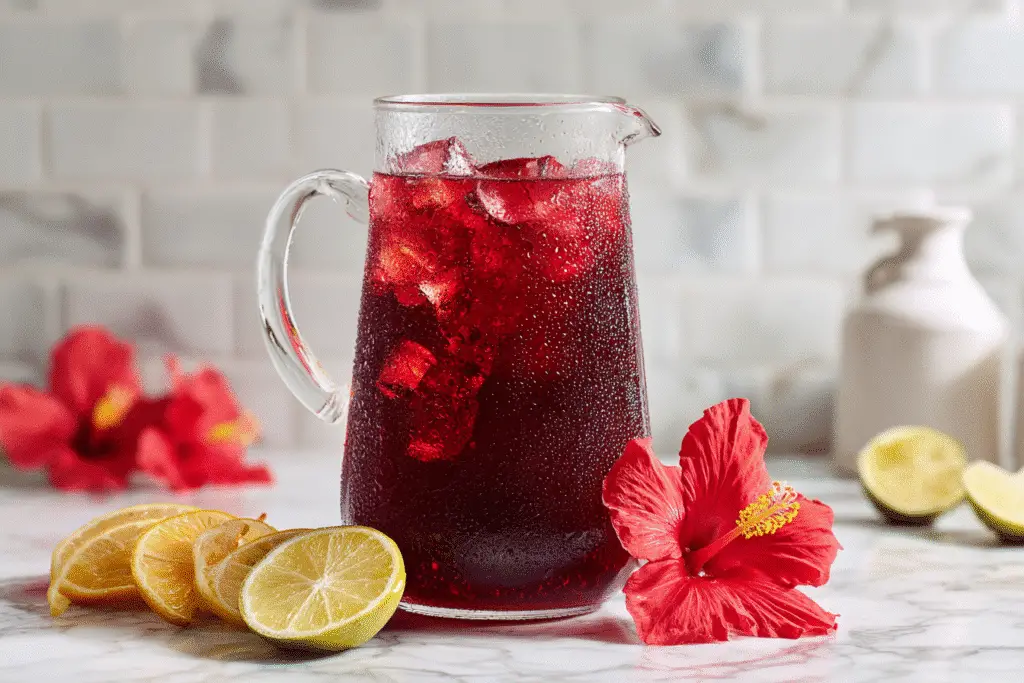Hibiscus water benefits go way beyond its gorgeous ruby-red color and tangy flavor. Known as agua de Jamaica in parts of Mexico and Central America, this chilled floral drink is gaining attention worldwide as both a delicious refreshment and a natural health booster. From heart support to allergy relief, hibiscus water packs more than hydration—it’s a wellness powerhouse you can sip daily.

And the best part? You don’t need to be a herbalist to enjoy it. With just a handful of dried hibiscus flowers or tea bags, some water, and a touch of sweetener, you can whip up a pitcher at home and reap its benefits all week long. (If you love naturally vibrant drinks, you may also want to check out this antioxidant-rich recipe.)
Hibiscus water is a refreshing, lightly tart drink rich in antioxidants, vitamins, and plant compounds. Research suggests it may:
- Support heart health by lowering bad cholesterol and blood pressure
- Enhance brain function and memory
- Boost immune defenses
- Soothe digestion and promote gut health
- Help manage weight naturally
- Reduce allergy symptoms
- Protect kidneys and urinary health
Simple to make and naturally hydrating, hibiscus water is a flavorful way to give your wellness routine a lift.
Table of Contents
Hibiscus Water Supports Heart Health
One of the most celebrated hibiscus water benefits is its impact on heart health. This vibrant drink contains powerful plant compounds—like anthocyanins and catechins—that work together to lower risk factors for cardiovascular disease.
Research shows hibiscus may help:
- Reduce LDL cholesterol (the “bad” kind)
- Prevent cholesterol absorption in the body
- Promote vasodilation, meaning it relaxes blood vessels for smoother blood flow
- Lower high blood pressure, a key risk factor for heart disease
Registered dietitians highlight that hibiscus water’s nutritional profile makes it a natural, plant-powered way to keep your cardiovascular system strong. While it isn’t a replacement for medication, regularly sipping hibiscus water alongside a heart-healthy diet may support long-term wellness.
Pro tip: If you’re watching your sugar intake, keep hibiscus water lightly sweetened or unsweetened—this way, you’re nourishing your heart without adding extra calories.
(You might also enjoy this guide to heart-healthy foods that pair beautifully with hibiscus water.)
Hibiscus Water Benefits Brain Health
Your brain loves hibiscus water just as much as your heart does. The secret lies in its high concentration of anthocyanins—the same antioxidants that give hibiscus its deep crimson color. These compounds are known inflammation fighters, which is key because chronic inflammation is often linked to cognitive decline.
Studies suggest that hibiscus compounds may:
- Protect brain cells from oxidative stress
- Support memory and focus
- Reduce the risk of neurodegenerative conditions like Alzheimer’s
- Enhance short-term memory (according to emerging animal research)
Another standout nutrient in hibiscus is quercetin, a plant flavonoid tied to neuroprotection. Quercetin may help slow brain aging by shielding nerve cells from damage.
In short, regularly sipping hibiscus water isn’t just refreshing—it could also help you stay sharp, focused, and mentally resilient as you age.

Hibiscus Water Boosts Your Immune System
If you’re looking for a natural way to support your body’s defenses, hibiscus water is a smart (and delicious) choice. This floral infusion is packed with vitamin C, a nutrient well known for strengthening immunity and helping the body fight off infections.
But that’s not all—hibiscus water also delivers:
- Flavonoids and phenolic compounds that reduce inflammation
- Antioxidants that neutralize harmful free radicals
- Plant polyphenols that promote stronger cellular defense
By lowering inflammation and oxidative stress, hibiscus creates a healthier internal environment where your immune system can thrive. It’s like giving your body’s defense team an upgrade.
And because hibiscus water is naturally hydrating, it also helps keep mucous membranes moist—a simple but often overlooked line of defense against germs.
Quick tip: Try drinking hibiscus water chilled with a squeeze of lemon for an extra vitamin C punch. This combination not only boosts your immune health but also makes the flavor even more vibrant.
(If you’re interested in more immune-supporting foods and drinks, check out this wellness recipe collection.)
Hibiscus Water Improves Gut Health
Your digestive system benefits in a big way from hibiscus water. The same anthocyanins that give the drink its jewel-toned color also protect the stomach lining and may reduce the risk of gastric ulcers. Some studies even suggest hibiscus could be a gentler alternative to certain over-the-counter ulcer medications.
But the gut perks don’t stop there. Hibiscus water also:

- Supports the gut microbiome, encouraging the growth of beneficial bacteria
- Strengthens the intestinal lining, improving overall digestive health
- Helps regulate digestion, making it easier to break down and absorb nutrients
With its natural anti-inflammatory and antioxidant properties, hibiscus water helps create a balanced, resilient gut environment. And since the gut plays such a huge role in immunity and overall well-being, this is one benefit you won’t want to overlook.
For maximum gut support, keep hibiscus water lightly sweetened—or skip the sweetener altogether. Too much added sugar can undo some of the digestive benefits.
(You can also try pairing hibiscus water with fermented foods—like yogurt, kefir, or kimchi—for a double boost to your gut health. Find ideas in this probiotic-rich recipe guide.)
Hibiscus Water Can Help With Weight Management
If you’re looking for a refreshing alternative to sugary sodas or flavored waters, hibiscus water is a smart swap. When made with little or no sweetener, it’s low in calories, hydrating, and naturally flavorful—making it easier to cut back on high-calorie drinks without feeling deprived.
But hibiscus may also play a more active role in weight control:
- Regulates metabolism thanks to plant flavonoids that influence fat processing
- Supports satiety, helping you feel fuller between meals
- Reduces fat accumulation in some animal studies, hinting at possible obesity-supportive benefits
While the research is still emerging (and somewhat mixed), early findings are promising: hibiscus could be a natural ally in long-term weight management.
Quick tip: If you’re making hibiscus water at home, experiment with spices like cinnamon or ginger instead of sugar for a naturally sweet, metabolism-friendly boost.
(For more inspiration, explore this list of light, nourishing recipes that pair beautifully with hibiscus water.)
Hibiscus Water May Alleviate Allergies
Allergy season can be brutal, but hibiscus water might offer some natural relief. Compounds in hibiscus have been shown to stabilize mast cells—the immune cells that release histamine and trigger sneezing, watery eyes, and congestion. By calming down these overactive responses, hibiscus helps reduce the intensity of allergy symptoms.
Here’s how hibiscus water may help:
- Minimizes histamine release, reducing runny nose and sneezing
- Supports immune balance, so your body doesn’t overreact to allergens
- Works preventatively, when consumed weeks ahead of allergy season
Herbal experts often recommend using hibiscus water as both a preventive drink (leading up to spring or fall) and a soothing option once allergies strike.
Pro tip: Drink hibiscus water consistently in the weeks before seasonal allergies hit for the best results. Pairing it with other anti-inflammatory foods, like turmeric and leafy greens, can further support your body’s allergy defenses.
Hibiscus Water Encourages Kidney Health
One of the most impressive hibiscus water benefits is its ability to support kidney function. Research shows that hibiscus may improve renal markers like blood urea nitrogen and protein levels in urine—both indicators of healthier kidney performance.
Even more, hibiscus has a mild diuretic effect, meaning it increases urine output and helps the body flush out excess fluids and toxins. This natural cleansing action supports not only kidney health but also the urinary tract, reducing the risk of infections.
Studies suggest hibiscus water may:
- Boost kidney filtration, improving overall detoxification
- Protect against kidney damage linked to oxidative stress
- Enhance urinary flow, which helps prevent urinary tract infections (UTIs)
For people looking for a gentle, natural way to care for their kidneys, hibiscus water is a flavorful ally. Just remember: keep it lightly sweetened to avoid counteracting its benefits.
Pro tip: Enjoy hibiscus water as part of your weekly hydration routine—alternating with plain water and herbal teas for variety and balance.

Conclusion:
From heart and brain protection to gut health, immunity, and kidney support, hibiscus water benefits go far beyond hydration. This vibrant drink is proof that wellness doesn’t have to be complicated—it can be as simple (and delicious) as a chilled glass of ruby-red hibiscus.
So the next time you’re craving something refreshing, skip the soda and brew a pitcher of hibiscus water. Your body—and your taste buds—will thank you.
If you found this guide helpful, share it with a friend or leave a comment with your favorite way to enjoy hibiscus water. Want more vibrant, health-forward recipes? Explore these refreshing wellness drinks.
Explore beautifully curated weight loss pink salt recipe ideas on Sofie Recipes on Pinterest and find your next favorite healthy habit!
FAQs
What happens when you drink hibiscus water daily?
Drinking hibiscus water daily may help lower blood pressure, support heart and kidney function, and provide a steady source of antioxidants. It also keeps you hydrated while replacing sugary drinks with a healthier, low-calorie option.
What disease is cured by hibiscus?
Hibiscus doesn’t “cure” diseases, but research shows it can help manage conditions like high blood pressure, high cholesterol, and urinary tract infections. It works best as part of a balanced lifestyle—not as a stand-alone treatment.
Does hibiscus tea help arthritis?
Yes, hibiscus tea and hibiscus water contain anti-inflammatory compounds that may ease arthritis symptoms by reducing swelling and oxidative stress. While it won’t reverse arthritis, it can support joint comfort when paired with a healthy diet.
How long do you have to drink hibiscus tea to lower blood pressure?
Studies suggest that noticeable blood pressure improvements may appear after 2–6 weeks of consistent daily consumption. However, results vary by individual, and hibiscus should be used as a complementary approach—not a replacement for prescribed medication.
